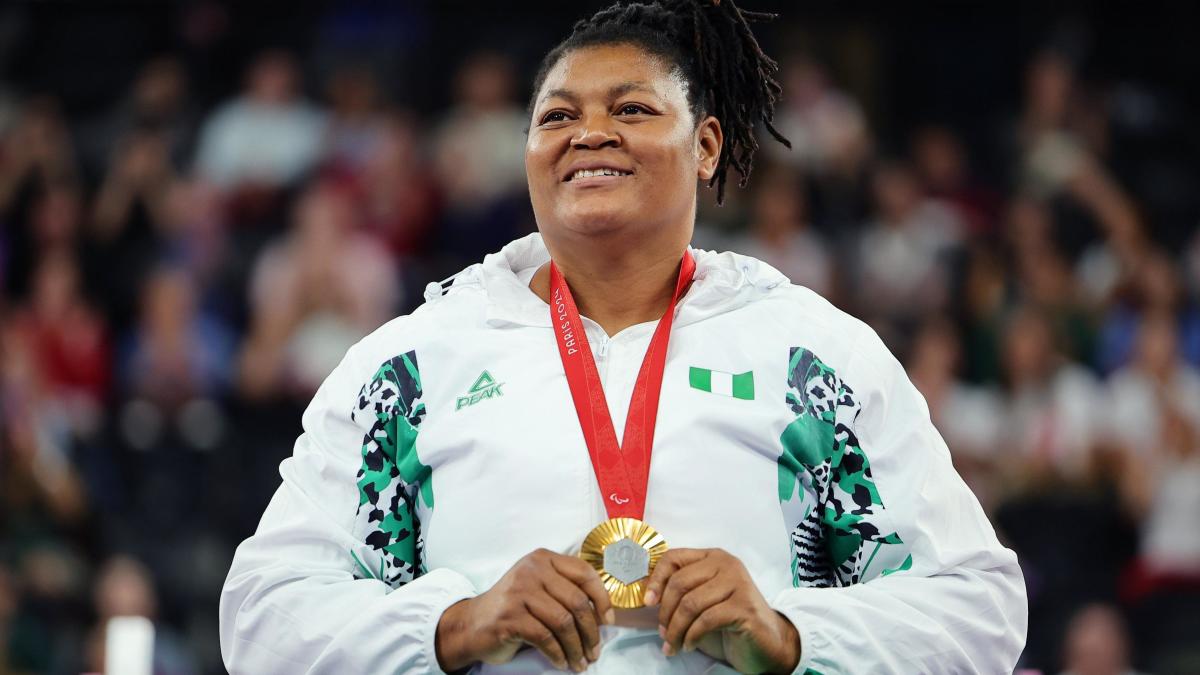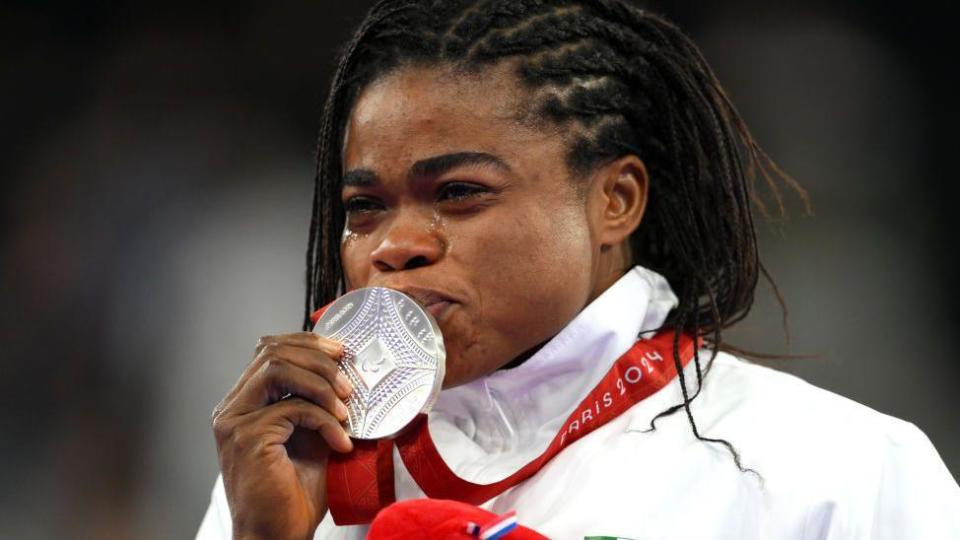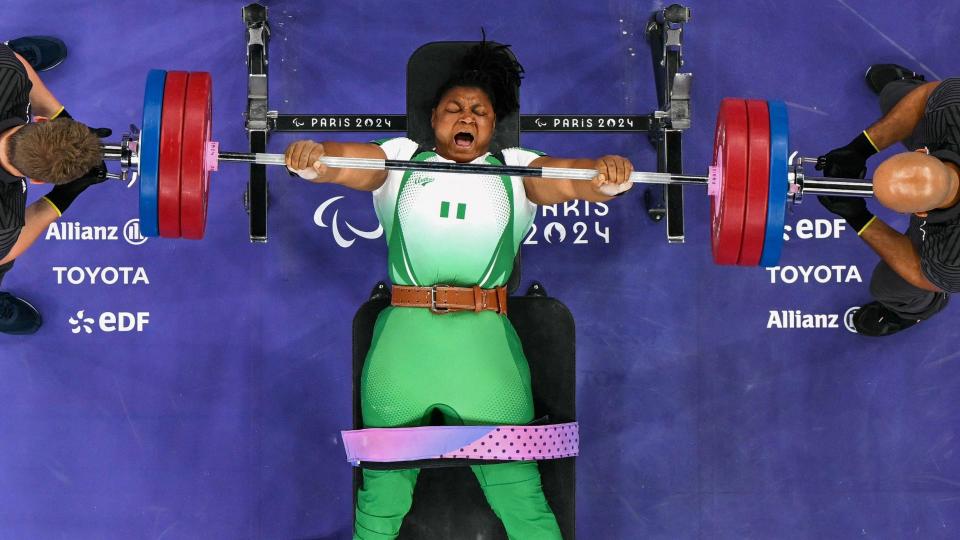


Nigeria’s para-powerlifting star Folashade Oluwafemiayo says her dedication and focus helped her to set a new world record at the 2024 Paralympic Games in Paris.
The three-time world champion broke her existing mark in the over 86kg category, becoming the first female para-athlete in history to lift 166kg.
With the gold medal secured, the 39-year-old returned to lift 167kg and improve her world record.
“I just keep on training. Even when I’m sick, I still go for training,” Oluwafemiayo told BBC Sport Africa.
“I never allow anything to distract me, though sometimes I have pains.
“But still, I don’t want anything that will depress me from achieving my goal.”
Oluwafemiayo had won gold in the under 86kg weight class at Tokyo 2020, but admitted she was nervous at first in Paris because of the large turnout of fans at the Porte de la Chapelle Arena – a stark contrast to empty stands during the Covid-affected games in Japan.
“My first lift, I was shivering somehow, but coming out for the second one, that confidence just came,” she said.
“I was praying that God just give me the strength, so the confidence just came from nowhere. I have that confidence to do more.”
Oluwafemiayo held the world record at 165kg before competition, and also beat her compatriot Josephine Orji’s Paralympic record of 160kg with her second lift.
“When I went for that 166 kg I felt I still had some strength in me,” Oluwafemiayo said.
“I was just giving a try, not knowing that everything will just go well.
“As a first female to set a record of 167kg, I feel very happy. Achieving the gold medal and the world record, I feel great because it has been my dream.
“This is what I want, and I went for it.”


Oluwafemiayo took up powerlifting in 1999 but her career has blossomed since the London 2012 Paralympics, where she won silver in the 75kg category.
She has a Commonwealth Games gold medal in her collection alongside her world and Paralympic titles, which have made her a shining light in the sport.
Chiemeka Charles Ezenwanne, president of Nigeria Para-Powerlifting Federation, hailed Oluwafemiayo as an “outstanding” and “dedicated” athlete.
“She is disciplined. [The] commitment is her own,” Ezenwanne told BBC Sport Africa.
“That victory is for the whole of Africa and Nigeria. I am grateful to God for her strength.”
Nigeria’s powerlifters won four medals in total in the French capital, which all came from the women on the team.
Onyinyechi Mark, making her first appearance at the Paralympics, set a new world record of 150kg in the 61kg category while fellow debutant Esther Nworgu clinched the silver medal in the 41kg class despite concerns over a dislocated shoulder.
“I never expected any medal from this competition, reason being that I made an injury and the doctors confirmed that I should not compete because it will get critical,” Nworgu told BBC Sport Africa.
“I want to rule my world. I want to win gold medals, break records and create records.
“That was my intention before coming but injury comes in.”
For Oluwafemiayo, the overriding emotion was pride.
“Being the captain of the team, I wish all of us win our medal,” Oluwafemiayo said.
“I’m very happy for Esther, Gift (Mark Onyinyechi) and Bose Omolayo, because she won silver too. So, I give God glory on behalf of them.”
The remarkable success of African competitors was evident in the para-powerlfiting medal table in the French capital.
Egypt closed the Paralympics with two golds, two silvers and two bronze medals to finish third, one place ahead of Nigeria.
The West African nation had topped the standings at the 2012 and 2016 Games and finished second behind China at Tokyo 2020.
“I feel very great for Africa, and I pray for more of it,” Oluwafemiayo said.
“I don’t want it to come from only Nigeria, I want medals to come from other African countries.”
China dominated the powerlifting event with 15 medals in 20 events, but Oluwafemiayo is optimistic the performance of Egypt and Nigeria will inspire other African countries.
“I pray that the spirit of unity in sports will bind us together so that more athletes will come from Africa, and Africa will continue to be number one all over the world,” she said.


Nigeria’s Olympic team returned home without a medal from Paris, and the contrast is clear with the Paralympians who took home seven medals.
Yet funding remains a major point of contention for Nigerian para-athletes.
“They (administrators) should give us good facilities and equipment to train, because when we have good equipment to train, we have improvement,” Oluwafemiayo explained.
“We have private companies that are supporting the athlete, but in Africa and in Nigeria, we don’t have that.”
The African Paralympic Committee has decided to make 3 September the African day of disability sport and Nworgu hopes this will inspire her colleagues and the next generation to see ability in disability.
“Sports is everything, sports will build you mentally, emotionally, spiritually, and physically,” the 21-year-old said.
“When you believe you can do it, you see yourself doing it.
“While in sports, there are many things you got to realize about yourself that you’ve never known.
“Sport is like an X-ray. It brings you out and shows you what you are inside.”